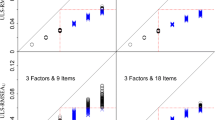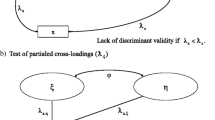Abstract
Effective social indicators must be stable when individual or societal characteristics are unchanged and dynamic when circumstances alter. Highly reliable measures may be poor indicators because they are insensitive to change. Little evidence is available on the sensitivity or validity of objective and subjective indicators. A lack of panel data has restricted the assessment of the stability of subjective measures.
This paper examines longitudinal data on a representative sample of 2162 Canadians interviewed in 1977 and again in 1979. Test-retest correlations of approximately 0.50 were obtained for satisfaction and self-anchoring ladder measures among respondents who reported no significant changes in their lives during the past two years. Correlations were substantially lower, as expected, for those reporting life changes. Comparisons of the absolute values of these subjective indicators show that very little change in quality of life measures occurs when stable circumstances are reported but the indicators rise or fall significantly when situations change with downward adjustments being more dramatic than upward modifications. Positive and negative life events had little effect on overall evaluations of life quality.
In general, these findings provide very strong evidence for the stability and validity of subjective indicators over time. These measures, with one exception, were constant in unchanging situations and sensitive to change when it occurred.
Similar content being viewed by others
Bibliography
AndrewsF. M. and CrandallR.: ‘The validity of measures of self-reported well-being’, Social Indicators Research 3 (1976), pp. 1–20.
AndrewsF. M. and McKennelA. C.: ‘Measures of self-reported well-being: Their affective, cognitive and other components’, Social Indicators Research 8 (1980), pp. 127–155.
AndrewsF. M. and WitheyS. B.: Social Indicators of Well-Being: American's Perceptions of Life Quality (Plenum, New York, 1976).
BradburnN.: The Structure of Psychological Well-Being (Aldine, Chicago, 1969).
CampbellA., ConverseP. E., and RodgersW. L.: The Quality of American Life: Perceptions, Evaluations, Satisfactions (Russel Sage Foundation, New York, 1976).
CampbellD. T. and FiskeD. W.: ‘Convergent and discriminant validities by the multitrait-multimethod matrix’, Psychological Bulletin 56 (1959), pp. 81–105.
CantrilH.: The Pattern of Human Concerns (Rutgers University Press, New Brunswick, N. J., 1965).
JoreskogK. G. and SorbomB.: ‘LISREL IV: Analysis of linear structural relationships by the method of maximum likelihood’ (National Education Resources, Chicago, 1978).
McKennell, A. C., Atkinson, T., and Andrews, F. M.: ‘Structural constancies in surveys of perceived well-being’ in Szalia, A. and Andrews, F. M. (eds.), Comparative Studies on the Quality of Life (Sage Publications, London, forthcoming).
Murray, M. and Atkinson T.: ‘Gender differences in correlates of job satisfaction’, Canadian Journal of Behavioural Science (forthcoming).
RodgersW. L. and ConverseP. E.: ‘Measures of the perceived overall quality of life’, Social Indicators Research 2 (1976), pp. 127–152.
Author information
Authors and Affiliations
Rights and permissions
About this article
Cite this article
Atkinson, T. The stability and validity of quality of life measures. Soc Indic Res 10, 113–132 (1982). https://doi.org/10.1007/BF00302506
Received:
Issue Date:
DOI: https://doi.org/10.1007/BF00302506




